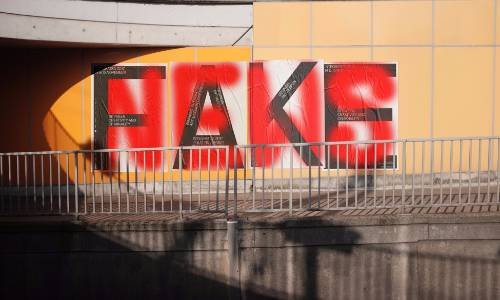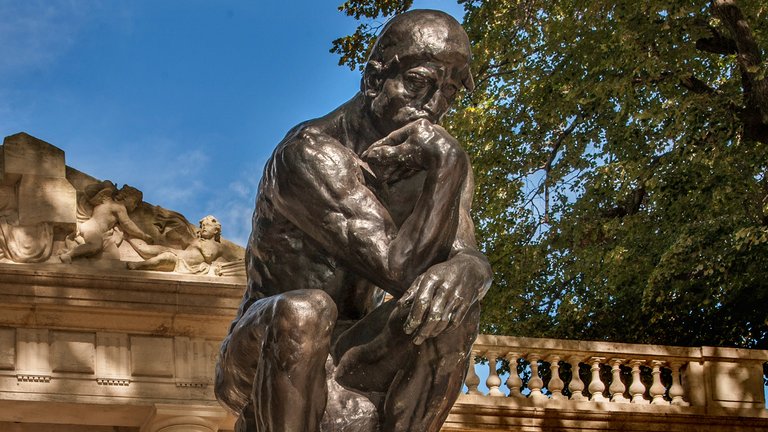
Is it just me? Or is Fake News a thing?
First off, I'm not interested in any specific interpretation of the term in that it applies to politics directly, which I delved into on my previous post. I'm going to start by asking a few questions and then see if I get anywhere. I'm going to attempt to put into practice some of the things I've learned thus far with my recent interest in Philosophy and by many degrees, I'm no expert, just a curious person who hopes to always ask why.
My first question is. What is "fake"? Is it an imitation? Is it the opposite of real?. See where I'm going here. We have a variety of definitions of the word "fake" so it's important to define the context in which we use it. Can we agree on that? Then, it would only make sense to do the same thing with the word "news" so that we can come to a common understanding, and hopefully an agreeable one, with consensus as to what the whole term means. For the sake of this argument I'll use the term "fake" to mean the opposite of "real" and "news" to mean differing views of opinions and events.

source
To add a little bit more perspective, I was watching some political pundits and I think I've found some context for the term. Now it's hard not to gravitate too far away from politics, because the term is, I believe, purely political. I've deduced that the growth of Facebook and availability and variety of information on the Internet is the reason behind why we keep hearing the term "fake News". Even in Malaysia, where I reside, I've heard it used by politicians. Now to put this context into perspective, I will ask the following question.
Is "fake news" a byproduct of corporations resistant to change?
Now we've concluded that "fake news" is a term that seems to be mainly directed at content available through different social media sites on the Internet. Can we agree on that? What content is not that important. Now there are a few places we can go from here, but I'd like to explore the intent behind the term and how it relates to the question. Is "fake news" a byproduct of corporations resistant to change? It's safe to say these corporations are news related, so that would mean traditional media and online media. So who might have the motivation to coin the term "fake news" and why? How does this relate to change? Some might say that in the corporate world, if you don't embrace change you will die. So if either the traditional or online media felt threatened, and resisting of change, which would have more motivation to pursue the term? Of course, there could be all kinds of motivations for a corporation to espouse a "fake news" campaign but it seems fair to say that their motives are interlinked both politically and financially, because even the traditional media corporations are also relevant in the online space, aligned with certain political parties and be interested in making money.

source
I conclude by saying that "fake news" is not simply a piece of information someone should not believe, but rather a campaign led by traditional media corporations to put into question views and perspectives they don't agree with and can't control. The reason why? I'll leave that to you.
Are you a part of my "echo chamber"?
Yes you are! And I'd very much appreciate the upvote if you've made it this far! Just kidding. No, but really. Ok! I'm not sure why I wanted to dig myself a deeper hole by including the topic of the echo chamber. But I guess my point is that it's important not to fall victim to fake news within your echo chamber. No, kidding again! It's important to look at what's happening within your echo chamber, specifically on the Internet, and open yourself up to asking as many questions that begin with Why until you're satisfied!
Day Eleven
The End
Many years ago I visited the island of Patmos, where St John The Divine is supposed to have written the Book of Revelation. It was my first trip to Greece, and I knew not one word of the language upon arrival. While I was enjoying the luxury of a barber shop shave, I heard the guy in the next chair to mine point at the newspaper he had been reading and repeatedly refer to it by calling it "efimerída". A younger Greek man waiting his turn to be shaved, or clipped, asked me in impeccable English how I was enjoying his country. After giving a polite answer to that and a few more questions, I asked him if "efimerída" meant "newspaper" in Greek. He said it did. Then I asked, guessing wildly, if he knew whether "efimerída" was related to our English word "ephemeral". He said, in a parched tone that I subsequently learned was very Greek: "But yes, of course, you can tell by the sound."
My point is that if you think of the news, in whatever form it is conveyed, as ephemeral, and supplanted in our heads by something else within days, at most, the almost complete triviality of the stuff, 'fake' or not, relegates it to its place in the pecking order, which is obviously the bottom. Indeed, its place may even be under the bottom, although I don't personally feel the need to look for it there. Or, as the Brits like to remind us, newspapers are good only to wrap fish & chips, or flowers, by the day after they are published. I would add to that list their widespread use as insulation to fill the massive, uneven gaps at the bottom of Brit doors in the bloody cold and dank of an English winter. Journalists like to claim that they're writing 'the first draft of history' by mouthing whatever their corporate bosses tell them to mouth. Unfortunately, that turns out to be what 'fake news' actually is, par excellence: somebody's propaganda presented by a nice, shiny, but very cheap suit who likes to run his mouth. But since its ephemeral, who cares?
I wish I could wrap my fish and chips in some Facebook. All jokes aside though, I'm more interested in figuring out the reasons why people take it for face value and emotionally, rather than looking at it like information to be filtered through the individuals lens, critically. I could go at it from the angle of continually being bombarded with information. The information highways was what they referred to the Internet as, and with this glut there is so much that is just trivial and distracting that people forget to think critically about it. Instead they react emotionally with a comment on social media and in a day (or even less) it's on to the next thing. So is fake news just the result of this shifting demographic who is discovering information that the the inventors of the term, the "mainstream" media, want to censor? Politically I'd say yes and mainly due to the Drumpf's use of Twitter. Years back I imagined the next election to be a social media election (i glamorized this with the image of American Idol) and I wasn't half wrong. When the conventional media is against you and the internet is in almost every home, it makes sense that he has 53.5 million followers (ranked 18th). As for the question. In an ephemeral sense I don't care, but when it comes to the confusion and polarization we're seeing today I'm concerned.
It may simply be a function of age, although I think not, that there's now seems to be so much information, in the sense that computer science people think of information, that no one can adequately figure out what is factual, roughly speaking, and what's just white noise amplified to the point of being deafening. On the other hand, there's new cross-disciplinary thinking about historical fact, and about our deep history, that would qualify as knowledge no matter how much white noise there is presently. And as someone with some useful research training, I can say with certainty that I can now find factual, unbiased information on any subject I'm interested in trying to understand correctly in minutes, about things that used to take hours or days in a library. In other words, I'm stumped.
You have that foundation already that many younger people don't have. Think about a Millennial in University now, who grew into this technology and way of "researching", it must be so different for them when they search for information and wonder what's right or wrong. In other words, I guess we're all stumped!
Unfortunately there isn't a subject in school for thinking critically, in the future I can see that changing. However with all the bombardment of information it does take a special individual to find the truth. Btw I started an acapella steemit fire cypher. You have been called out by K.E.N. https://steemit.com/firecypher/@kenentertainment/2018-steemit-fire-cypher-kenentertainment